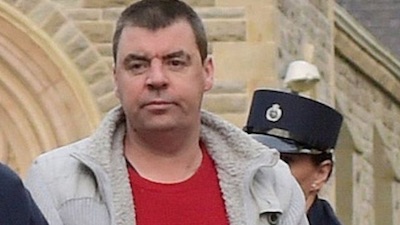
After two years behind bars, prosecutors today dropped all charges against Seamus Daly, the only man still charged in connection with the 1998 Omagh bomb.
The case against the South Armagh man, who has been in custody since April 2014, all but ended last month when the prosecution’s star witness, who has changed his story several times, again contradicted himself during a pre-trial hearing.
The 45-year-old has always denied any involvement in the bombing. He was arrested in 2014 while taking his pregnant wife to hospital to give birth. Days later he was charged and remanded to jail where he has remained since. Only a small group of friends and family worked for justice for a man who they said had become a convenient scapegoat.
Since 1999, Mr Daly has been publicly named in the media in connection with the Omagh bomb. All evidence was put before him back then and he was found to have no case to answer. In subsequent years he has faced two civil suits, and was found not responsible, and on appeal he was found responsible after contradictory evidence from just one witness.
Prosecutors claimed he had been in hiding, although he had in fact been living openly in Jonesborough, County Armagh. He was re-arrested and jailed on remand without any new evidence beng presented.
Twenty-nine people died in the RIRA bomb attack, which is suspected to have been allowed to proceed for Britain’s own military or propaganda purposes. It was subsequently revealed that the RUC police “could have prevented” the attack. Britain still refuses to reveal key details of the case for reasons of “national security”.
An Irish republican from a well-known republican household, campaigners believe Mr Daly was jailed to quell growing pressure for a public inquiry. Mr Daly’s lawyer, Peter Corrigan, said the prosecution’s case was built on a “house of straw” and said he would be taking legal action over the two years’ incarceration.
A victims’ campaigner has said he agreed with the decision to drop the trial. Michael Gallagher’s son, Aiden, was one of 29 people who died in the tragedy. He said: “This was a difficult case and hinged on the testimony of one individual and that one individual did not seem to be up to meeting the test needed to put someone behind bars.
“For that reason I agree with the decision, regrettably, that happened today. There was no other option for the Public Prosecution Service or the judge but to deliver the verdict that we have just heard.”
Mr Gallagher has been the most prominent of those campaigning for justice for Omagh. He said it was obvious listening to the prosecution ‘star witness’ Denis O’Connor, a builder from Kilkenny who claimed he received a call from Seamus Daly around 20 minutes after the bomb detonated on August 15 1998, that the case was going nowhere.
“I think it should have been obvious a lot earlier than that.”
He said he was trying to contain his anger and channel it positively into seeking the truth.
“We need some answers, we need to know what went so drastically wrong 18 years on -- conviction after conviction has failed in Omagh and yet there is so much knowledge about Omagh.”
He added: “If there is any decency in society, in the people that manage our state, they need to work together to get the truth to the families of what happened.” He said most families had given up on achieving justice.
“It will be difficult for all of them but also very difficult for all those other victims out there who are expecting answers.”
Amnesty International called for a public inquiry to “investigate comprehensively the circumstances surrounding” the Omagh bomb.
They said an investigation was needed “to ensure lessons are learnt, included from the failure to carry out adequate investigations into the bombing”.
In September 2013, British Direct Ruler Theresa Villiers ruled out the possibility of holding a public inquiry. Last month she condemned what she said was a “pernicious narrative” by those who questioned the role of state agents in the conflict.
Director of Amnesty International in the Six Counties, Patrick Corrigan, said: “The collapse of this case means that the families bereaved and those injured by the bomb are left without answers about what happened that day and whether it could have been prevented.
“The failure of the State to deliver justice through the criminal courts only reinforces the case for an inquiry to help deliver truth.
“The Secretary of State must now revisit her indefensible decision to refuse an inquiry into the Omagh bombing.
“The families have been drip-fed information over the years, with new wounds opened each time and with none of the alleged bombers ever being held criminally responsible.
“What the bereaved, and Northern Ireland more broadly, deserve is the fullest account possible of what happened in Omagh, delivered by an independent inquiry, with cooperation from all sides.
“All that families want is the truth. Surely that is not too much to ask?”
Amnesty is also calling on the Irish and United States governments to offer full cooperation with the work of such an inquiry.
![[Irish Republican News]](https://republican-news.org/graphics/title_gifs/rn.gif)
![[Irish Republican News]](https://republican-news.org/graphics/title_gifs/harp.gif)

